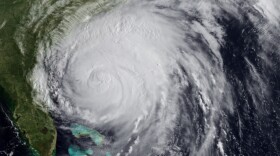As I record this commentary, there is a powerful storm approaching the East coast. The last hurricane to hit this area affected a number of people in my office. One of the women who had worked for me lived in Schoharie. Her home and family were OK but she was devastated by what happened to her town. This time, my thoughts are in Brooklyn where my son and his family live – near the water but in the area that serves as a port so we hope more protected.
I’m no meteorologist. So how do you talk about a storm?
One of my former students worked for FEMA at the time of Katrina and came here bristling with stories of what went wrong at all levels of government. I hope those problems of planning and coordination have been solved at least for the moment.
Michele Landis Dauber wrote an article that came out at the time of Katrina which she called “The Sympathetic State” in which she described American government relief efforts going back to the Revolution. Initially Congress simply reacted to disasters as they happened. The history is one of picking and choosing – my disaster is worse than yours, my problems are more deserving – floods, droughts, injuries in war, economic depressions, fires, you name it. Things will go to pot if we help you but you’ve got to help me. As a nation we slowly learned that people don’t welcome disaster, unemployment, or broken bones. And they don’t try to live on meager government relief if they have a way to do better.
Unfortunately the Tea Party has been trying to turn the clock back and we’ve already had difficulty with the notion that people in the face of natural disasters need a helping hand.
There is another way that this storm is worth thinking about. We can’t pin any one weather event on global warming. There have been bad storms before. But the northeast rarely gets hurricanes. Last year’s storm and this one have broken the pattern. Weather events are getting much worse for everyone – for people in the way of floods in the northeast or in the Mississippi Valley, for people in the way of hurricanes on the Gulf Coast as well as the northeast, for people in dry areas of the West that have been going up in smoke, and for skiers that have been looking for snow on their favorite mountains.
Global warming is not just a candidate for casual conversation, like: How’s the weather? Nice day isn’t it. Global warming is changing our world.
People who have not seen the world change don’t want to believe it and don’t want to believe they we mere humans can do anything about it. But I have seen what coal did to St. Louis in the 1920s and what the shift to other feuls did as well. I have worked in areas where irrigation and farming practices denuded the soil. And there are lots of parts of the world in which bad farming practices are enlarging the deserts. Bad farming practices played a large part in creating the legendary dust bowl of the 1930s which drove many thousands off their farms and turned hardworking Americans into homeless, jobless migrants.
Global warming is no different in terms of our ability to affect it, except that the effects will be very long lived, and may become irreversible. We have to stop it now. The candidates won’t tell you but stopping it will involve sacrifice – sacrifices that patriotic Americans and devoted parents must make.
Steve Gottlieb is Jay and Ruth Caplan Distinguished Professor of Law at Albany Law School and author of Morality Imposed: The Rehnquist Court and Liberty in America. He has served on the Board of the New York Civil Liberties Union, and in the US Peace Corps in Iran.
The views expressed by commentators are solely those of the authors. They do not reflect the views of this station or its management.



